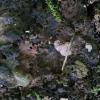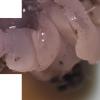
31-10-2025 09:19
 Lothar Krieglsteiner
Lothar Krieglsteiner
Can somebody provide me with a file of:Rogerson CT

09-08-2025 13:13
 Maria Plekkenpol
Maria Plekkenpol
Hello,Yesterday I found these on burnt soil. Apoth

28-10-2025 19:33
 Nicolas Suberbielle
Nicolas Suberbielle
Bonjour à tous,Je voudrais votre avis sur cette r

25-11-2016 13:54
 Stephen Martin Mifsud
Stephen Martin Mifsud
Hi, I found numerous seeds of Washingtonia robusta

28-10-2025 22:22
 Bernard Declercq
Bernard Declercq
Hello.I'm searching for the following paper:Punith

28-10-2025 15:37
Carl FarmerI'd be grateful for any suggestions for this strik

28-10-2025 11:29
 Tanja Böhning
Tanja Böhning
Hello, I found this very small (ca 0,5mm) yellow
Ombrophila species
B Shelbourne,
20-09-2024 00:16
• With spores too suggests genus Ombrophila and the O. violacea group.
• Seems comparable to O. 'janthina-margarita angio'.
• I'm not sure how to separate O. 'violacea small spored' but there are only two observations outside Europe.
Habitat: On angiosperm log, sawn-end (decorticated), surface blackened and well decayed, quite saturated, on the ground, amongst herbaceous plants, close a stream, generally damp and occasionally flooding, mixed deciduous woodland, Low Weald, England, mid-September.
Apothecia: Pale pink-violet in maturity, diameter < 5 (~7) mm, glassy-translucent, turbinate-discoid, densely caespitose and overlapping in maturity, superficial, very short and thick stipe, appressed, uneven/pitted surface, internally jelly-like, margin indistinct, uneven and slightly lobate, undulating, out-rolled, disc convex in maturity (when unrestricted), soft and gelatinous texture, no evidence of a subiculum, with tiny capitate conidiophores of a seemingly unrelated anamorph on the surface (possibly a parasite).
Asci: Surprisingly small relative to the apothecia, mature and turgid ~65-75 x 6-7 (7.5) um, cylindrical-clavate, 8-spored, obtusely biseriate when turgid, one spore at the apex, croziers, rings bb, form looks typical for Ombrophila (Baral, 1987), apex rounded-truncate, more acute-truncate when flaccid, distinct thickening and more truncate when flaccid, walls also showing some thickening, no noticeable dextrinoid reaction from contents, many discharging in water mount after some time.
Spores: Ellipsoid, homopolar, poles rounded, a +/- symmetric large globose LBs at each pole and some smaller ones (~1-3).
Free spores in water: (5.1) 5.4 - 6.2 (6.4) × (3.2) 3.5 - 3.7 (3.9) µm, Q = 1.5 - 1.7 (1.8), n = 30, mean = 5.8 × 3.6 µm, Q mean = 1.6.
Paraphyses: Narrow cylindrical, width ~2-3 um, apex often slightly inflated, multi-septate, with cylindrical hyaline VBs, reddish en masse.
Medullary: Loose textura intricata, highly gelatinised, narrow hyphae, numerous small to medium hyaline crystals.
Ectal: Textura prismatica, with a large guttule in many cells, seems to be a gelatinised layer on the surface but contents not clearly seen.
Hans-Otto Baral,
20-09-2024 10:04

Re : Ombrophila species
Yes, from the relationship of O. jamthina s.auct., a very complex group which requires DNA study.



 100x-0002.jpeg
100x-0002.jpeg